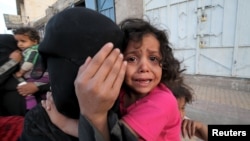U.N. aid agencies report the humanitarian impact of the nearly two month Saudi-led bombing campaign in Yemen and a blockade of fuel and other imported relief supplies is enormous.
After taking stock of the situation following a recent five-day humanitarian pause that allowed for the delivery of life-saving assistance, the agencies say they are extremely troubled by what they see.
Officials say the few days in which the guns fell more or less silent has allowed them to view the extent of suffering being endured by hundreds of thousands of citizens displaced by the conflict. The U.N. refugee agency has revised its displacement figure upwards from 300,000 two weeks ago to more than 545,000 now.
The death toll also has gone up over the past two months of escalating fighting. Latest United Nations figures put the number killed at 1,849 and the number wounded at nearly 7,400.
UNHCR spokesman, Adrian Edwards says the temporary cease-fire agreed to by the Saudi Arabian coalition and Houthi rebels has allowed aid workers to access areas that had previously been off limits.
“What we found were traumatized populations — people afraid, upset, and struggling to meet their basic needs," Edwards explained. "In the Amant Al-Asemah area of Sana’a, we interviewed displaced people staying with host families where several households were crowding under a single roof, with inadequate bathrooms and water supply. Fuel shortages make it difficult to pump water.”
Worse off
Many people were economically vulnerable before the crisis. Now, Edwards says they are even worse off. He says most have lost their livelihoods and are entirely dependent on aid.
He tells VOA the severe shortage of fuel in the country due to import restrictions on commercial and humanitarian aid continues to be a critical issue. Edwards says the lack of fuel is compounding many existing difficulties.
“It is pushing up prices," he said. "It is making it difficult for people to get about. The amount of fuel we were able to bring in is really only a drop in the ocean of needs — approximately, 10 percent of the amount of fuel needed in the space of a month. So, you have a significant need to get more in.”
The U.N. refugee agency reports the humanitarian pause made it possible to fly in more aid and transport supplies to distribution hubs in the capital Sana’a and Aden. It says in-country stocks of relief items now are three times higher than they were before the pause.
However, it notes checkpoints, insecurity and high transport prices make it difficult to move about and distribute aid to the people in need. The World Food Program says it too is experiencing similar difficulties.
WFP says it had planned to provide food to nearly three-quarters of one million people during the humanitarian pause, but it was only able to reach 400,000. It says it needs more time and more security to help those in need. The agency is appealing for, what it calls, a series of predictable breaks in the fighting to be able to deliver food to the hungry.












